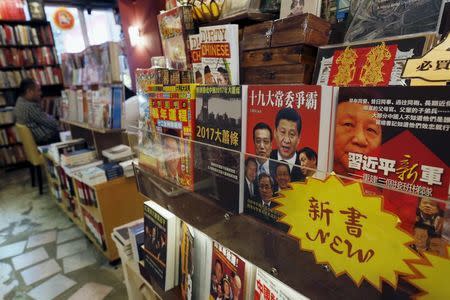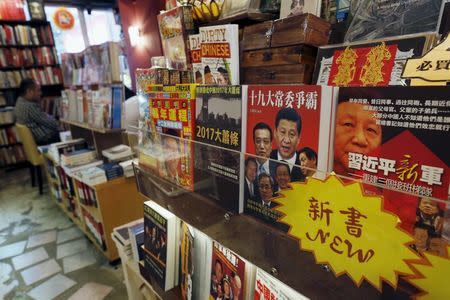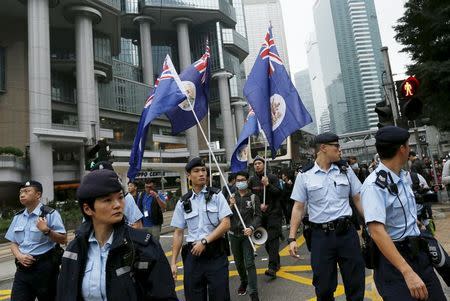Thousands protest in Hong Kong over missing publishers; booksellers worried
By Donny Kwok and Kalum Chen
HONG KONG (Reuters) - Thousands of people took to the streets of Hong Kong on Sunday in a reprise of anti-China protests of over a year ago, demanding to know the whereabouts of five missing people linked to a local publisher of books critical of Beijing's leadership.
Other publishers and book vendors are unnerved by the mysterious disappearances, and in some cases they have pulled books critical of Beijing's leaders from their shelves.
In three bookstores selling political books visited by Reuters, owners declined to be interviewed, citing the fear of mainland anger. Hong Kong, a former British colony handed back to China in 1997, is constitutionally guaranteed freedoms and autonomy from Beijing for 50 years but the series of disappearances has led to suspicions that mainland law enforcement officers were ignoring the law.
Lee Bo, 65, a shareholder of Causeway Bay Books and a British passport holder, went missing from Hong Kong in late December, although his wife has withdrawn a missing persons report saying he travelled to China voluntarily to assist in an unspecified investigation.
Four other associates of the publisher have previously been unaccounted for, since late last year.
Dressed in yellow and holding up yellow umbrellas, the hallmark of anti-China protests that crippled parts of the city in late 2014, the protesters demanded to know the whereabouts of the missing booksellers.
"Today's Lee Bo is you and me tomorrow," the protesters shouted.
The demonstrators gathered outside government headquarters – the scene of pro-democracy protests in late 2014 – carrying banners that read: "Release Hong Kong Booksellers Now!"
The Hong Kong government said in a statement it was "firmly committed to protecting the freedom of expression and freedom of publication".
"The rule of law is the cornerstone of our society," it said, adding that police are investigating the cases and have sought assistance from mainland authorities.
Protest organisers said about 6,000 people took part.
"Nobody is safe in Hong Kong now," said Bao Pu, who published the secret memoirs of Zhao Ziyang, a former Communist Party general secretary who was purged after the 1989 Tiananmen Square crackdown. His father, Bao Tong, was the most senior Chinese official jailed over the protests in Beijing.
As of Thursday, over 500 publishers, writers, booksellers and members of the public had signed an online petition pledging to: "Not fear the white terror and uphold the principle of publication freedom". White terror is a term used to describe periods of political persecution by authoritarian regimes.
Britain and the United States have expressed concern about the disappearances.
"EVIL INFLUENCE"
China's Foreign Minister Wang Yi skirted a direct question on whether the men were under Chinese detention at a recent press conference. The Guangdong and Shenzhen Public Security Bureaux, and the Hong Kong and Macau Affairs Office in Beijing, have not responded to repeated Reuters' requests for comment.
China's state-run Global Times tabloid, however, wrote in a recent editorial that the booksellers were exercising an "evil influence" in China through their political books. The newspaper went on to say that it was "reasonable" for law enforcement agencies to "circumvent the law when they seek cooperation from an individual for investigation."
Political gossip books and exposes on Chinese leaders have been a lucrative niche market for Hong Kong booksellers catering to Chinese visitors accustomed to pervasive censorship of sensitive literature back home.
But now, some stores have distanced themselves from such books.
At the PageOne bookshop chain, a young sales assistant told Reuters some of these books had been pulled recently.
"This is the company's decision," he said. "I'm not very clear about it. We only have history books now."
A spokesperson for PageOne said the firm wouldn't comment.
At the People's Book Cafe, posters of Mao Zedong - the late founder of modern China - were hanging above mainland Chinese tourists scouring the aisles to buy banned books on China's leaders, including Mao himself.
Paul Tang, the owner, told Reuters, that in the event the industry for banned books collapsed in Hong Kong, he expected it to "migrate to other nearby countries" like Taiwan or Japan given the huge sustained demand from Chinese visitors.
At two other small, independent bookshops visited by Reuters; Insiders Books and Best Reading Bookstores, staff refused to comment about the disappearances.
The Causeway Bay Books shop, which has been linked to all five missing men, remains locked, while at the firm's warehouse in an industrial building where Lee was last seen in late December, stacks of books wrapped in brown paper were piled up outside the door.
One pile of books was on Chinese President "Xi Jinping's ultimate battle with the old Communists" according to an invoice glued to the side.
Lee told Reuters in November that "the only possible reason" for the disappearances of his associates was because of a new book they were going to publish, that some local media said was an expose on Xi Jinping's love life. Lee, however, declined to give specifics at the time.
(Additional reporting by Rain Liang, Venus Wu and James Pomfret; Writing by Anne-Marie Roantree; Editing by Raju Gopalakrishnan)





